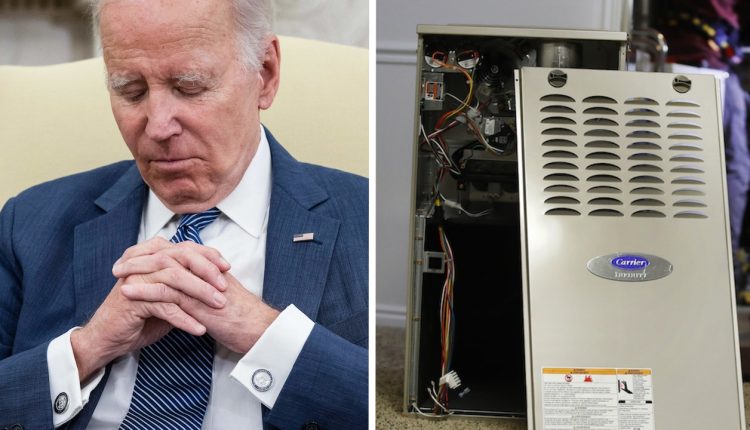The Biden administration announced its latest regulatory action targeting home appliances late Friday, this time targeting popular home gas-powered furnaces.
The Department of Energy (DOE) said the energy efficiency regulations would slash household utility costs by $1.5 billion on an annual basis while reducing greenhouse gas emissions from the residential sector. The proposal, according to the agency, require non-weatherized gas furnaces and those used in mobile homes to achieve a far higher level of efficiency than cheaper models on the market.
“At the direction of Congress, DOE is continuing to review and finalize energy standards for household appliances, such as residential furnaces, to lower costs for working families by reducing energy use and slashing harmful pollutants in homes across the nation,” Energy Secretary Jennifer Granholm said in a statement.
“Today’s measure, along with this Administration’s past and planned energy efficiency actions, underscores President Biden’s commitment to save Americans money and deliver healthier communities,” she continued.
FAILED BIDEN NOMINEE QUIETLY APPOINTED TO TOP ROLE OVERSEEING WAR ON HOUSEHOLD APPLIANCES
DOE’s finalized regulations, which are slated to go into effect in 2028, specifically require furnaces to achieve an annual fuel utilization efficiency (AFUE) of 95%, meaning manufacturers would only be allowed to sell furnaces that convert at least 95% of fuel into heat within six years. The current market standard AFUE for a residential furnace is 80%.
Because of the stringent AFUE requirements, the regulations would largely take non-condensing gas furnaces — which are generally less efficient, but cheaper — off the market. But consumers who replace their non-condensing furnace with a condensing furnace after the rule is implemented face hefty installation costs.
BIDEN ADMIN BEGINS ENFORCING NATIONWIDE LIGHTBULB BANS, IGNITING BACKLASH FROM GOP: ‘LIBERAL FANTASIES’
“There are some really technical reasons why this is such a concerning rule,” Richard Meyer, the vice president of energy markets, analysis and standards at the American Gas Association (AGA), previously told Fox News Digital in an interview. “It has to do with the ability for consumers to be in compliance with this new efficiency standard.”
“They’re going to have to, in many cases, install new equipment to exhaust gas out of their home. These higher efficiency units, or so-called condensing units — a lot of consumers have them in their home, but a lot of consumers don’t. So, this rule would require additional retrofits for a lot of consumers. And those retrofits can be extremely cost prohibitive.”
Overall, AGA has estimated the DOE regulations would remove up to 60% of current residential furnaces off the market.
However, the DOE said in its announcement that gas furnaces account for approximately 19% of annual U.S. residential energy use, meaning that higher efficiency would save energy and, therefore, curb emissions. It projected that the regulations Friday would cut carbon emissions by 332 million metric tons over the next three decades.
In addition to consumer furnaces, over the last several months, the DOE has unveiled new standards for a wide variety of other appliances including gas stoves, clothes washers, refrigerators and air conditioners.
EXPERTS WARN BIDEN ADMIN’S WATER HEATER CRACKDOWN WILL HIKE PRICES, REDUCE CONSUMER CHOICE
According to the current federal Unified Agenda, a government-wide, semiannual list that highlights regulations agencies plan to propose or finalize within the next 12 months, the Biden administration is additionally moving forward with rules impacting dozens more appliances, including pool pumps, battery chargers, ceiling fans and dehumidifiers.
The Biden administration boasted in December that it had taken 110 actions on energy efficiency rules in 2022 alone as part of its climate agenda.
The DOE said Friday that, altogether, its past and planned appliance regulations will save Americans $570 billion and reduce greenhouse gas emissions by more than 2.4 billion metric tons over the next 30 years.
However, consumer groups and experts have criticized the administration over its aggressive energy efficiency campaign. They have argued the new regulations will reduce consumer choice and increase costs for Americans.
“It’s just spreading to more and more appliances. It seems that almost everything that plugs in or fires up around the house is either subject to a pending regulation or soon will be,” Ben Lieberman, a senior fellow at the Competitive Enterprise Institute, previously told Fox News Digital.
“Consumers aren’t going to like any of it,” he added. “These rules are almost always bad for consumers for the simple reason that they restrict consumer choice.”
Read the full article here

